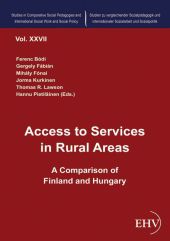 Neuerscheinungen 2014Stand: 2020-02-01 |
Schnellsuche
ISBN/Stichwort/Autor
|
Herderstraße 10
10625 Berlin
Tel.: 030 315 714 16
Fax 030 315 714 14
info@buchspektrum.de |

Ferenc Bódi, Gergely Fábián, Mihály Fónai
(Beteiligte)
Access to Services in Rural Areas
A Comparison of Finland and Hungary
Herausgegeben von Bódi, Ferenc; Fábián, Gergely; Fónai, Mihály et al.
2014. 324 p. 210 mm
Verlag/Jahr: EHV ACADEMICPRESS 2014
ISBN: 3-86741-898-5 (3867418985)
Neue ISBN: 978-3-86741-898-0 (9783867418980)
Preis und Lieferzeit: Bitte klicken
The Berlin Wall, the symbol of the divided continent of Europe collapsed almost a quarter century ago. In the one and a half decades since the fall of the Iron Curtain , the European Union has expanded significantly and essentially the borders between these states ceased to exist. However, this historically created divide between east and west within the European Union in many ways remained. Access to Help in Rural Areas provides the reader important information concerning the condition of the local organization of social services (LOSS) and how citizens access them daily in two relatively underprivileged regions of two different countries in the eastern and still relatively divided part of the EU. The book not only provides the outcomes of the two country regional surveys, it shows the juridical background and public administration of the LOSS and their alterations, particularly with respect to the effects of the crisis. This research is a harbinger of continued and expanded international research built upon twenty years of scientific collaboration within the LOSS program. In both countries, government officials are responsible for arranging social and health care services and promoting the wellbeing of the citizens. Although there are differences between the areas of Northern Hungarian Great Plain and Northern Finland, continued research cooperation would likely open new opportunities for developing services and safeguarding the wellbeing of people living in Hungary and Finland. Research cooperation would generate new knowledge about how citizens experience wellbeing, the phenomena as both a regional and temporary process, and finally about welfare services themselves and the potential for application of technology to safeguard services.


